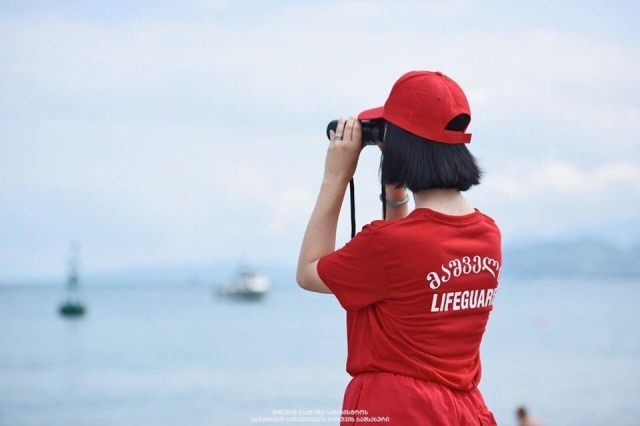Is Georgia Ready for its First Female Lifeguards?
For the first time in the history of the country, Georgia has new female lifeguards who started work at the Black Sea coastal city Batumi on Saturday, joining a male-dominated rescue corps for the holiday season.
20 female students of Batumi Naval Academy were selected for the role in the first instance, but as the academy and the Georgian Interior Ministry says the number will increase as other female students have also expressed a desire to take on the job.
160 lifeguards are already patrolling Georgia’s Black Sea coast, and their number will increase to 250 in the coming days alongside the increase in the number of holidaymakers.
All lifeguards have undergone specialized training and a first aid course as per the agreement signed between the Emergency Management Service of the Ministry of Internal Affairs of Georgia and the Batumi Naval Academy.

Although the appearance of the female lifeguards was a huge step forward for gender equality in the country, they face an uphill battle for recognition.
The published images of several aspiring female lifeguards undergoing training shared online last week were followed by sexist and discriminatory statements online, with males criticizing their looks, questioning their fitness, or drawing unflattering comparisons with the 1990s US TV series ‘Baywatch.’
Some comments say that “women cannot save lives,” or “maybe they are good at artificial breathing” or they “did not expect to see female lifeguards” at all.
Women's rights advocate from the non-governmental organization, Women for a Common Future, Ida Bakhturidze, said that the comments written on social networks about female lifeguard once again showed that there is a consensual attitude towards women's bodies and appearance.

“A lifeguard is a person who has to save the life or health of people and their looks have nothing to do with their ability to do so. However, in our country, certain professions have a gender and male society believes they should fit the “standards,” being waitresses, flight attendants, etc.,” she stressed.
Bakhturidze explains that such an attitude is humiliation and that it is pure discrimination to assess professionalism by gender.
She said that male and female lifeguards have similar uniforms but with men, no-one ever raised the issue of looks or mentioned the ‘Baywatch’ lifeguards.
“Everything goes to sexual consumption and such comments show the stereotypes of misogynic and sexist fantasies about women,” she said.
Bakhturidze believes that if women appear more often in male-dominated fields, such discriminatory attitudes towards them will slowly weaken.
Batumi City Council member Nodar Dumbadze was the author of the comment on Facebook saying the female lifeguards “might be good at artificial breathing.”
When asked for an explanation, Dumbadze said he didn’t consider his comment discriminatory or sexist.
"Be it a woman or man, the lifeguard has a great responsibility – saving lives. They must be prepared psychologically and physically. I have doubts that these girls are well-prepared. However, I do not exclude that in future they might become really good lifeguards,” he said.
Dumbadze said his concern is not about the fact that females were tasked to do this job, but that they are students of the Naval Academy.
“Students should not be given such important tasks as saving lives,” he said.

Tamar Chugoshvili, Deputy Chairperson of the Parliament of Georgia, stated it is sad and shameful to see the comments of some members of society following the appearance of the first Georgian woman lifeguards on the Batumi coast.
She stressed this attitude once again emphasizes the gravity of stereotypical approaches in society and the unacceptable attitude towards novelty, especially when women are involved.
“I want to thank the girls for joining this very responsible job and wish them every success! You are very tough!” Chugoshvili said.
Photo: Emergency Management Service
By Thea Morrison












